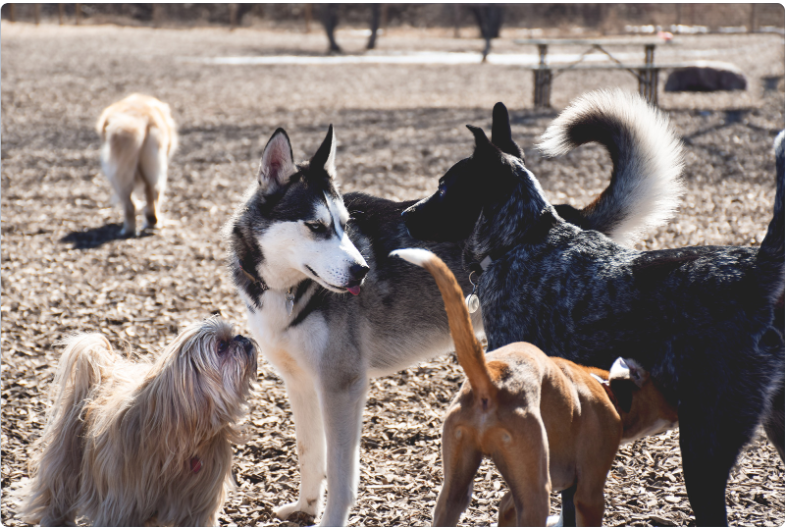One brisk day in March, Anna decided to take her new 8 month old puppy to the dog park. Her friends had raved about how great it would be for her new Australian Shepherd to socialize with other dogs and how much fun they all had letting their dogs burn off some energy. So, she filled her thermos with coffee and grabbed Bandit’s leash. She briefly went through a few of his commands: Sit, Stay, Come, Down, etc. Then she grabbed her keys and they were off to the free Dog Park about 5 miles away. As she drove, she had a brief wave of concern as she thought about Bandit meeting other dogs she didn’t know. She had waited until he had been solid on his commands. But he was still a hyper puppy.
She arrived at the Dog Park with only a couple of people and dogs walking around. She let out a sigh of relief that it wasn’t too busy. For the first few minutes, things seemed to be going well. A Border collie and parent did a meet and greet with Bandit and now the dogs were playing happily. Another few minutes went by and another pitbull mix had joined into the play. Out of the corner of her eye, she saw a lady with a German Shepherd pulling aggressively to get into the gate. The park was down to 4 dogs and the Border Collie was quickly recalled to the owner. She was about to recall Bandit when the German Shepherd ran full stride at him and attacked. The owner was nowhere in site. It took two other owners, a lot of banging noises and the swift move of an owner creating a choke leash to disarm the German Shepherd. Anna didn’t remember much after that except rushing Bandit to the Animal Hospital. He suffered a ripped ear and a bite to his neck. The owner of the German Shepherd managed to slip away without a trace. For years, Bandit had trauma from the incident. He went from happy puppy to reactive, anxious dog. His physical injuries healed long before his psychological ones did. Being the responsible dog owner, Anna took him to a professional trainer to help with the reactive behavior, but the one incident had already cost her several thousands of dollars.
So, the question we have to ask is “Was this good socializing for Bandit?” and the answer has to be a resounding NO. In fact 1 out of 7 dog owners report that their dogs have been attacked in a dog park (see https://www.k9ofmine.com/dog-park-statistics/ for more statistics on dog parks). But almost all owners believed that their dogs were getting valuable playtime and socialization in a “safe” environment. Of those owners that regularly attend a dog park, the majority will tell you that they have witnessed bad dog behavior and irresponsible owners. Yet many will continue to take their dogs to dog parks without a second thought….because they have been told it is good for them to socialize. I am currently one of those pet parents with a dog traumatized by an attack. He is a sweet, easily trainable dog and we have a huge yard for him to play with our other Aussie. But I will not subject him to an open uncontrolled dog park. If we do engage in outside “socialization”, I would like it to be a positive experience in a controlled environment with select responsible pet owners.
So, what does this have to do with Public Schools? Well, the first argument most homeschoolers hear is that their kids are not being properly socialized. There is this general belief that an uncontrolled collection of children within a classroom is somehow good for socialization. But I will argue that bad socialization does not help a child in any way. Children (and any other animal on the planet) needs to receive guidance from their parents. The quality of guidance strongly influences their confidence, their moral compass and their ability to avoid situations which are no good for them. We understand that if a person works in a toxic environment, they should find another job. But do they know how to draw that line? When and how are they taught to make these distinctions? Subconsciously, a voice is telling them that they just need to deal with the toxicity because that is the norm (this is what was expected of them in public school). Hmmm. Isn’t it interesting that we just accept bad/inappropriate behavior as the norm? Or that we believe that we need to work in environments that don’t have our same moral standards? So, before you repeat the “socialization” mantra, think about what KIND of socialization you expect. Write it down. This will help you process what you think your child needs to thrive in their adult life. I’ll start:
- Confidence
- Understanding that failure is not permanent and can be a learning experience
- That they should not be forced to be around bullies
- There are difference learning styles and that is OK
- Respect different interests
- Respect different strengths
- Facts are facts. Opinions are not facts.
- Word Salad/brainwashing is disputable with facts
- Original thought can be a good thing
- Basics: Math, Science, Language, Writing, FACTUAL HISTORY. Etc.
- Arts or Music to develop the other side of the brain
- Time to play, experiment or explore
- Appropriate Expectations
- Individuality
Instead, good productive socialization can occur with multiple adult interactions, sports clubs or other interest groups. Home schooling or Online schooling can be a game changer that instills the confidence and tools needed for tackling adulthood but also handling inappropriate social interaction. For example, if you stress appropriate behavior with your child, they are less likely to accept inappropriate behavior from others. Our current system is more concerned with political agendas and social virtue participation trophies. It is 6 – 8 hours a day for our kids who are looking to classmates and teachers for guidance and yes, socialization. So, we should be concerned if that guidance and socialization are provided by people that don’t share our values or have a warped agenda. For every instance of “good socialization” in the school system, there are just as many bad instances of socialization that they can do without.
In each case, traditional school or dog park there is a decent chance that the dog or the student will be traumatized, learn bad behavior or be seriously injured. At least in a dog park, we are there to intervene. Rarely is this the case in a public school classroom, in the hall, on the playground, etc. Unfortunately, the teachers are watching quite a few students, are generally overworked and exhausted by the end of the day. We cannot protect our children from everything and we don’t want to. But does that mean we throw them to the wolves in the name of “socialization”? If your answer is yes, then this blog is definitely not for you. But if you want to explore the reasons you feel obligated to public/traditional school, then stick around.

